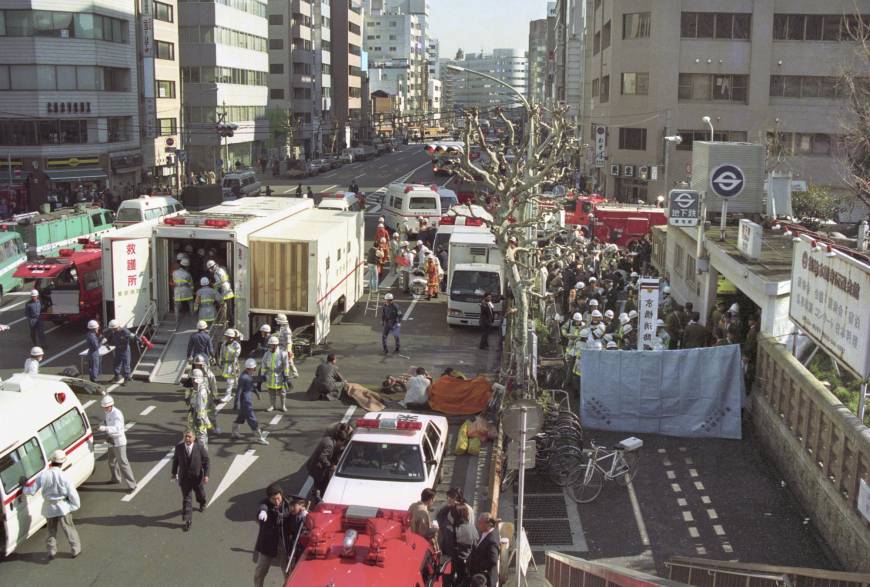Aum Shinrikyo: seven cult members executed over Tokyo subway sarin attack
Cult leader and six followers hanged for role in 1995 terror attack that killed 13

A free daily email with the biggest news stories of the day – and the best features from TheWeek.com
You are now subscribed
Your newsletter sign-up was successful
Seven members of a doomsday cult responsible for a sarin nerve gas attack on a Tokyo subway station that killed 13 people have been executed.
Cult leader Shoko Asahara, real name Chizuo Matsumoto, and six other members of Aum Shinrikyo were hanged at a Tokyo detention centre on Friday morning, Japan’s Ministry of Justice confirmed. Six other cult members remain on death row for their role in the 1995 attack.
What was Aum Shinrikyo?
The Week
Escape your echo chamber. Get the facts behind the news, plus analysis from multiple perspectives.

Sign up for The Week's Free Newsletters
From our morning news briefing to a weekly Good News Newsletter, get the best of The Week delivered directly to your inbox.
From our morning news briefing to a weekly Good News Newsletter, get the best of The Week delivered directly to your inbox.
Aum Shinrikyo started life in 1984 as a meditation and and yoga group led by Asahara, developing into a religious movement drawing on Buddhist, Hindu and Christian influences.
The group’s ideology rapidly became increasingly apocalyptic as cult leaders tightened their grip over their followers, with reports of former members and other perceived enemies being kidnapped or murdered.
In 1989, a lawyer working on a class action lawsuit against the cult disappeared, along with his wife and infant son: cult members would later admit to killing them.
By the early 1990s, Aum Shinrikyo had evolved into “a violent cult that sought confrontation with the state as a prelude to the end of civilisation”, says The Guardian.
A free daily email with the biggest news stories of the day – and the best features from TheWeek.com
What happened in the subway attack?
In 1993, Aum Shinrikyo began secretly manufacturing the deadly nerve agent sarin, which they first unleashed in June 1994 in the central Japanese city of Matsumoto, in an attack targeting the homes of judges.
Eight people died in that atrocity, whose perpetrators would remain a mystery until the Tokyo subway attack the following year.
On 20 March 1995, senior cult members released the nerve agent in five crowded train carriages en route to Tokyo’s busy Kasumigaseki subway station during morning rush hour.
Prosecutors at the group’s subsequent criminal trials would claim that Asahara ordered the attack in a bid to divert the attention of the authorities, who were planning a raid on the cult’s headquarters.
Thirteen people died of sarin poisoning, and thousands more became unwell as a result of breathing in the gas.
The massacre “is remembered as a watershed event that deeply damaged a long-held sense of security felt by many in postwar Japan”, says The Japan Times.
Japan marked the 23rd anniversary of the deadly attack earlier this year, with workers at Kasumigaseki Station observing a minute of silence.
-
 Why are election experts taking Trump’s midterm threats seriously?
Why are election experts taking Trump’s midterm threats seriously?IN THE SPOTLIGHT As the president muses about polling place deployments and a centralized electoral system aimed at one-party control, lawmakers are taking this administration at its word
-
 ‘Restaurateurs have become millionaires’
‘Restaurateurs have become millionaires’Instant Opinion Opinion, comment and editorials of the day
-
 Earth is rapidly approaching a ‘hothouse’ trajectory of warming
Earth is rapidly approaching a ‘hothouse’ trajectory of warmingThe explainer It may become impossible to fix
-
 Epstein files topple law CEO, roil UK government
Epstein files topple law CEO, roil UK governmentSpeed Read Peter Mandelson, Britain’s former ambassador to the US, is caught up in the scandal
-
 Iran and US prepare to meet after skirmishes
Iran and US prepare to meet after skirmishesSpeed Read The incident comes amid heightened tensions in the Middle East
-
 Israel retrieves final hostage’s body from Gaza
Israel retrieves final hostage’s body from GazaSpeed Read The 24-year-old police officer was killed during the initial Hamas attack
-
 China’s Xi targets top general in growing purge
China’s Xi targets top general in growing purgeSpeed Read Zhang Youxia is being investigated over ‘grave violations’ of the law
-
 Panama and Canada are negotiating over a crucial copper mine
Panama and Canada are negotiating over a crucial copper mineIn the Spotlight Panama is set to make a final decision on the mine this summer
-
 Why Greenland’s natural resources are nearly impossible to mine
Why Greenland’s natural resources are nearly impossible to mineThe Explainer The country’s natural landscape makes the task extremely difficult
-
 Iran cuts internet as protests escalate
Iran cuts internet as protests escalateSpeed Reada Government buildings across the country have been set on fire
-
 US nabs ‘shadow’ tanker claimed by Russia
US nabs ‘shadow’ tanker claimed by RussiaSpeed Read The ship was one of two vessels seized by the US military